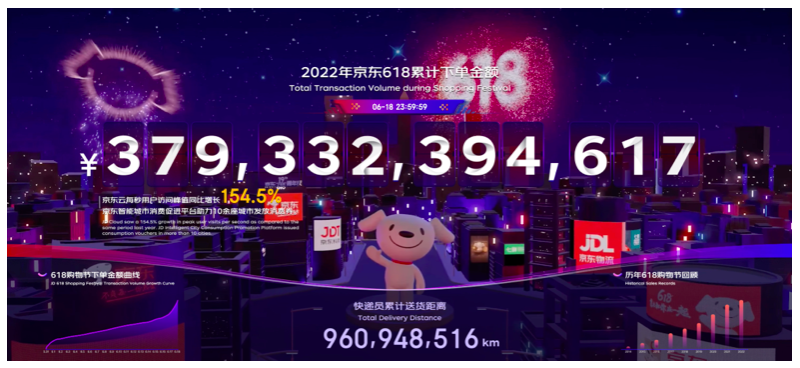Singles' day, 11.11, or “Double 11” originated as a celebration of singledom in China but has since become the biggest sales festival in the world, eclipsing the likes of Black Friday and Cyber Monday.
Read on to explore the highlights of this year’s festival through the eyes of Hot Pot China team.
The real winners of Double 11
- Emma Milligan, Account Director
“It’s no surprise that this year, just as in years before, live-streaming drove a significant proportion of Double 11 sales; 40% of all Tmall sales in fact. An estimated 80%-90% of those were driven by the two top live streamers, Li Jiaqi and Viya. Again, hardly surprising when on day 1 of the Single’s Day festival, Li Jiaqi sold $1.7 billion worth of goods in 12 hours.
From a sales perspective, there’s no denying their influence - where else can 20,000 cans of Afghan pine nuts be sold in under 15 mins? But a 5 minute slot with the King or Queen of Double 11 will cost brands a flat fee of at least £25,000. On top of this is a substantial commission and, most costly of all, the non-negotiable hefty discount. So forgoing profit (and even making a loss) is often the reality for most brands.
If the payoff brands seek is awareness, the offer is compelling; 250 million deal-savvy viewers watched Li Jiaqi’s 11.11 daily shows. But you can’t help noticing an almost identical structure: The host holds up a product, tells you the original price, puts complementary gifts one by one beside it, and finally shouts out the discounted price. Product reviews and sassy insights - which made Li Jiaqi famous - are now being dropped in order to get through a startling 36 products per hour. Despite the jaw dropping numbers, entertainment is taking a hit and brands need to ask the question: what value is this actually adding?”
It’s getting harder to trust 11.11 deals
- Chan Li, Senior Account Manager
“This year there has been a lot of backlash and negative feedback from consumers relating to brands at 11.11. In general, many consumers were questioning whether the 11.11 price was actually a truly amazing offer, or was it just the same price seen at other points throughout the year? On top of that, there were complaints across the social landscape about the product quality. Some people noted that products from major beauty brands didn’t appear to be full sized products, that they were close to the expiration date or that the quality did not appear to be as good as previous, non-11.11 purchases. Additionally, many consumers seemed to have grown tired of the overly complex deals on offer.
Even Tmall themselves seem to be playing down the festival.
Another area I found interesting was Tmall downplaying their results. Gone was the traditional glossy GMV totaliser and instead came Tmall telling consumers how 11.11 was doing good. The ‘golden era’ of Tmall may have passed. Traffic for brands is getting more and more expensive on the platform and combining that with heavy discounts can’t produce great ROI for all brands. Additionally, so much traffic went through 2 livestreamers. What about other brands not featured there? Perhaps it’s time brands took a broader look at the e-commerce landscape and not just rely solely on Tmall.”
Tmall moves from a discount-led 11.11 to an opportunity to change the future of retail.
- Paul Hickey, Head of Brand Strategy
“This year, Alibaba, owner of Tmall, focused on becoming more of a platform for promoting what they see as the future of retail. This year, Tmall pushed their agenda by being selective in the types of brands they promoted; This included 200 luxury brands, who gave Tmall access to exclusive products and content instead of discounts as well as special payment terms, exclusive services and the ability to enjoy offline after-sales services for consumers. ‘Green’ products were also a key focus, with Tmall giving preferential positions to over 500,000 ‘low impact’ products and offering over RMB100 million in vouchers to be used on ‘green’ products.
Seeing the slow down in growth of 11.11 and a shift in general attitudes towards the festival, it makes sense for Alibaba to readdress the role that 11.11 can play in the future of their business. The shift to trying to integrate omni channel offerings with luxury brands and promote more sustainable products may give a glimpse into what the future holds for the company. With the potential opening up of the traditional ‘walled gardens’ it seems like the right time for the company to refine its own strengths and give consumers a reason to choose them.”
11.11 is not an appealing proposition for me anymore; the once jaw-dropping discounts have all but disappeared.
- Chen Jin, Account Manager
“Singles’ Day is just not that appealing to me anymore. This is a sentiment echoed by many of my peers, as ultimately, the offers happening throughout the year often match or beat 11.11. Many brands that had previously relied on Singles’ Day to drive the majority of their revenue have decided to de-risk the event and look throughout the year for other opportunities to connect with consumers.
Whether that’s exclusive discounts for certain credit card or loyalty scheme members, or even exclusive discounts offline, you can often find a discount price that would match 11.11 throughout the year.
There have also been certain issues around product quality; are brands using 11.11 as an opportunity to clear old stock? I personally have made purchases at 11.11 only to discover that the product itself is almost at its expiration date. Was it really worth the discount? This sentiment has also been echoed on platforms like Little Red Book where many people talk about if the 11.11 discounts are really that impressive or worth it.”
Everyone was looking at Tmall and Douyin but JD.com saved the day.
- Adam Sandzer, Head of Commercial Strategy
“‘Look beyond the numbers’ Alibaba declared as sales hype and mega performance dashboards were replaced by messages around sustainability and accessibility. 9% year-on-year GMV growth on Tmall/Taobao may still be impressive but it’s the first time they failed to hit double digit growth. Discussions around the end of an era for Tmall are credible: Although we expect that they will evolve and come back with a response next year their rivals could well be stronger…
Douyin (China’s TikTok) did not hit the heights anticipated - much to do with stock allocation amidst supply chain challenges - but their commercial proposition is getting stronger. Meanwhile, JD.com, with its superior logistics and flexible operational models; including their owned stores for purchased goods, saw almost 30% year-on-year growth. They even hit the headlines by allowing the use of digital currency (eCNY) for the first time. According to several brands and TPs, JD.com sales performance saved the day and whilst the platform arguably receives less coverage, it has gained market share and has a clear competitive advantage that is getting bigger. With reference to JD.com’s logo...there is life in the ‘old’ dog yet and it’s an important platform for brands to consider as they enter and grow in China.”
Times are changing and it’s unsure whether
11.11 can keep up.
- Ash Zhang, Creative Strategist
“This year’s Double 11 seems to have hit the mark for some Chinese consumers, perhaps because they’re tired of the constant bombardment from brands and platforms aggressively discounting and promoting. Brands are constantly introducing ever-more complex special offers, cross-shop vouchers, in-store lucky draws, the list goes on. Yes, this did work for a long time, especially in the ‘golden-era’ of Double 11 a few years ago. However, many Chinese consumers are reassessing the desire to ‘buy buy buy’ and instead think about what quality and value means to them.
Chinese consumers are becoming more and more sophisticated, in other words, more patient. They care about the brand and the packaging, trying to spend time understanding a brand story before making any purchasing decisions. Tmall's role is also evolving. Previously seen as a pure sales channel, that is no longer true. I don’t think 11.11 will disappear but it will continue to evolve, eventually taking shape in a different format. And this year is just the first step.”
What about your brand?
- Fan Tu, Account Manager
“Double 11 initially targeted single people by providing discounts intended to make them ‘feel better’ about their relationship status and it became an overnight success. Over the past 12 years, more promotional driven festivals appeared: 3.8 (Goddess Day, a takeover of International Women’s Day), 12.12 (no real reason, just felt like a natural event after 11.11) and many more. When JD.com launched their 6.18 company anniversary shopping day, Tmall counter launched 6.18 Tmall “Ideal Life Shopping Season” to dominate the conversation. This has seen many brands link their success in China with Tmall.
It’s a globally acknowledged fact that everyone loves a deal but Alibaba mastered the “how.” With the growth of the platform and more users participating in these festivals, it seems perfectly reasonable for brands to want to participate too. But is it really benefiting them? When you take a step back, these festivals are essentially Alibaba building its own IP and teaching deal-conscious consumers that the black cat is your go-to animal when you want to purchase anything (Tmall 天猫, means ‘Sky Cat’ if directly translated). What a lot of brands don't understand is that 11.11 is not another Black Friday or seasonal festival to drive sales. It is a big part of Alibaba's drive for dominance and to convince consumers that Tmall has the best brands at the best prices. Livestreamers like Li Jiaqi and Viya make up a part of that strategy which is why they demand the lowest prices.
These sales festivals can work well for categories like FMCG and small local businesses who are thriving through Alibaba’s integrated marketing services but marketing teams need to be clear on the impact it will have on their brand. While participating in 11.11 might generate sales for brands, it also cements Tmall’s dominance and brand equity, not their own. While the festival is a great sales show, brands rarely get the stage time they are craving. They merely serve as one of the many background dancers to Tmall’s black cat logo who is front and centre in the spotlight.”
It’s clear that the changing demands of Chinese consumers are being heard and reflected in how Alibaba’s dominant Tmall approaches the Double 11 sales event but maybe market share challengers like JD.com are catering to demand faster and more effectively - 30% YoY growth compared to Tmall’s 9% speaks volumes.
What’s your brands strategy for Double 11 and the myriad of other Chinese sales festivals? If you’re not sure where to start our experts have got your back - drop us a message to chat about your opportunities in China.
Related blog posts

